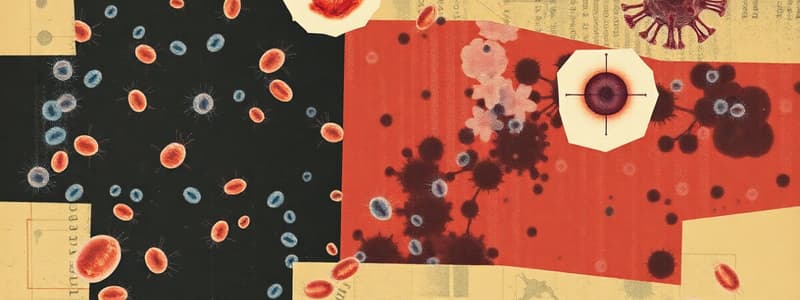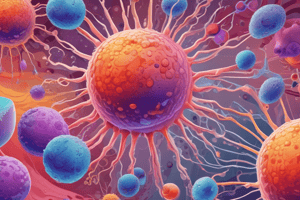Podcast
Questions and Answers
What is the main role of Granzyme B in targeting cells?
What is the main role of Granzyme B in targeting cells?
- Inhibiting viral replication
- Binding to the Fas receptor
- Catalyzing reactions that destroy the target cell (correct)
- Activating interferon production
How does the Fas receptor activation lead to apoptosis?
How does the Fas receptor activation lead to apoptosis?
- Through binding with the Fas ligand from TC cells (correct)
- By releasing interferons
- By stimulating antibody production
- By poisoning the target cell with Granzyme A
What is the primary function of interferons in the context of apoptosis?
What is the primary function of interferons in the context of apoptosis?
- Stimulating antibody production
- Inhibiting viral replication and enhancing defense mechanisms (correct)
- Directly destroying the target cell
- Decreasing the number of B cells
What role do antibodies play following the apoptosis of a target cell?
What role do antibodies play following the apoptosis of a target cell?
What distinguishes humoral immunity from other types of immunity?
What distinguishes humoral immunity from other types of immunity?
What is the primary function of T helper cells in the adaptive immune response?
What is the primary function of T helper cells in the adaptive immune response?
Clonal deletion is a process that helps lymphocytes do what?
Clonal deletion is a process that helps lymphocytes do what?
What role do perforins play in the mechanism of cytotoxic T cells?
What role do perforins play in the mechanism of cytotoxic T cells?
What is the role of regulatory T cells in the immune response?
What is the role of regulatory T cells in the immune response?
Which of the following describes the mechanism through which cytotoxic T cells kill infected cells?
Which of the following describes the mechanism through which cytotoxic T cells kill infected cells?
What is the main purpose of memory T cells?
What is the main purpose of memory T cells?
What is the key function of antigen-presenting cells (APCs) in the immune response?
What is the key function of antigen-presenting cells (APCs) in the immune response?
How does clonal anergy differ from clonal deletion?
How does clonal anergy differ from clonal deletion?
Flashcards are hidden until you start studying
Study Notes
The Adaptive Immune Response
- Comprised of lymphocytes, a type of white blood cell found in blood and lymphatic systems.
- Main types of lymphocytes include T lymphocytes and B lymphocytes, each playing distinct roles in immune response.
T Lymphocytes and Cell-Mediated Immunity
- T lymphocytes originate from bone marrow and mature in the thymus.
- Clonal deletion eliminates immune cells that react to self-antigens to prevent autoimmune responses.
- Clonal anergy occurs when immune cells evade deletion but remain non-functional.
T-Cell Action Steps
- Antigen Presentation: Neutrophils and macrophages phagocytose pathogens, acting as antigen-presenting cells (APCs) to T-helper (TH) cells.
- TH Cell Activation: Activates pathogen-specific cytotoxic (TC), memory (TM), and B-cells; produces cytokines to proliferate these cells and interferons to enhance immune response.
- Cytotoxic T Cells (TC): Directly attacks and kills infected cells through a series of mechanisms.
Mechanism of Cytotoxic T Cells
- TC cells target infected cells by binding to MHC molecules.
- Produce perforins to create pores in the infected cell’s membrane.
- Release granzyme A and B which enter the cell through perforations; A poisons the cell while B destroys it.
- Apoptosis is induced when TC’s Fas ligand binds to Fas receptor on the infected cell.
- Before apoptosis, the infected cell secretes interferons that inhibit viral replication and bolster defenses in nearby cells.
- Antibodies act against remaining viruses after infected cells undergo apoptosis; they opsonize the viruses, blocking their ability to infect new cells.
B Cells and Humoral Immunity
- Each B cell is specific to a certain antigen, like T cells.
- Activated by interactions with particular TH cells.
- B cells produce antibodies critical for humoral immunity, which is defense mediated by secreted molecules in blood and lymph fluid.
Studying That Suits You
Use AI to generate personalized quizzes and flashcards to suit your learning preferences.



